An Analysis of Social Media's Influence on Youth Mental Health
VerifiedAdded on 2022/11/24
|8
|1961
|148
Report
AI Summary
This report delves into the multifaceted relationship between social media and the mental health of young people. It begins by exploring the role of social media in youth activism and its function as a platform for connecting and campaigning on various issues, such as the 'Me Too' movement and political campaigns. The study then transitions to a critical examination of the adverse effects of social media on the mental well-being of youths, discussing the creation of negative body image, the prevalence of cyberbullying, and the resulting psychological issues like depression, anxiety, low self-esteem, and feelings of isolation. The report references various studies to support its arguments, highlighting the potential for excessive social media use to lead to a distorted perception of reality and contribute to mental health challenges, including suicidal tendencies. It emphasizes the importance of understanding these impacts to safeguard the mental health of young individuals in the digital age.
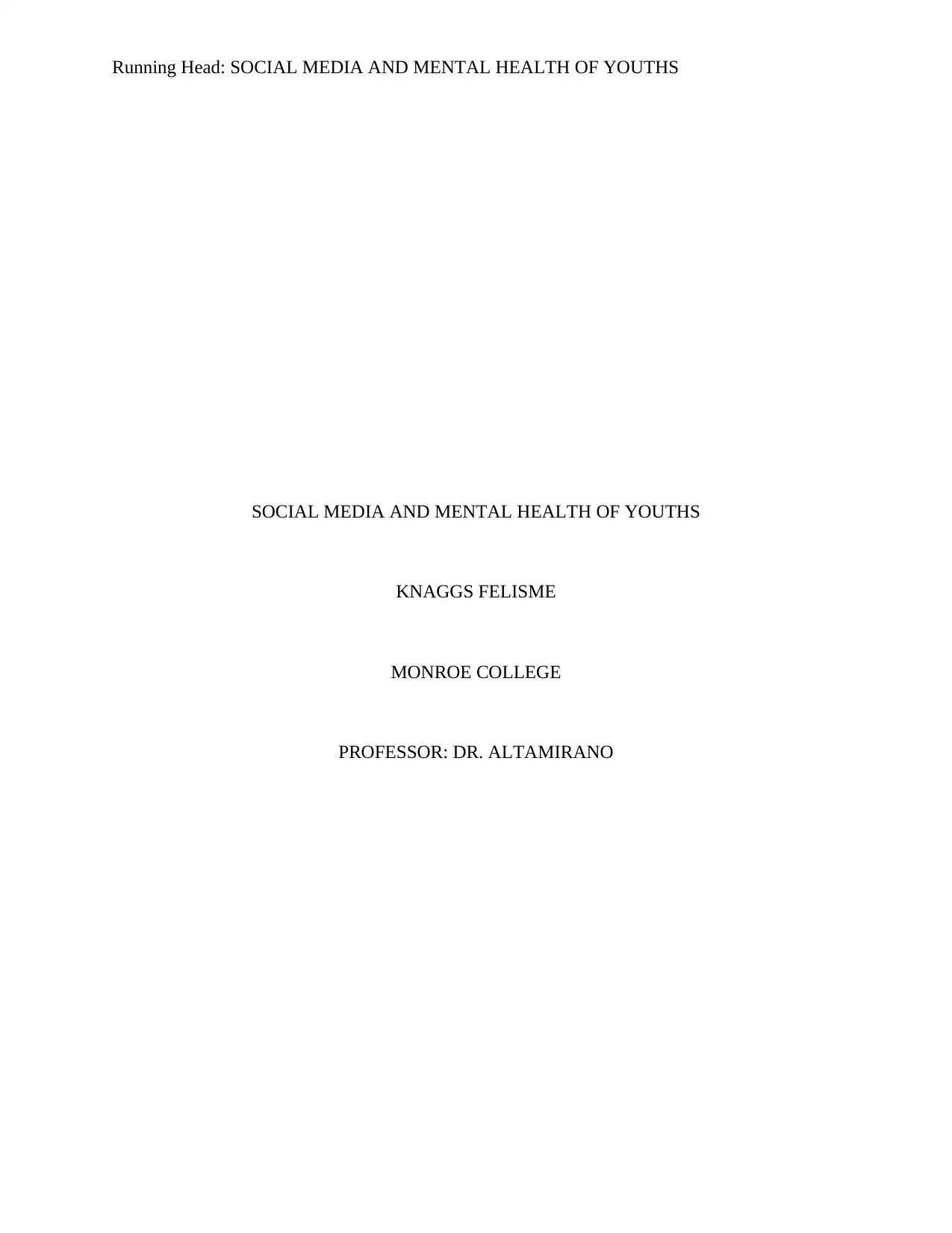
Running Head: SOCIAL MEDIA AND MENTAL HEALTH OF YOUTHS
SOCIAL MEDIA AND MENTAL HEALTH OF YOUTHS
KNAGGS FELISME
MONROE COLLEGE
PROFESSOR: DR. ALTAMIRANO
SOCIAL MEDIA AND MENTAL HEALTH OF YOUTHS
KNAGGS FELISME
MONROE COLLEGE
PROFESSOR: DR. ALTAMIRANO
Paraphrase This Document
Need a fresh take? Get an instant paraphrase of this document with our AI Paraphraser
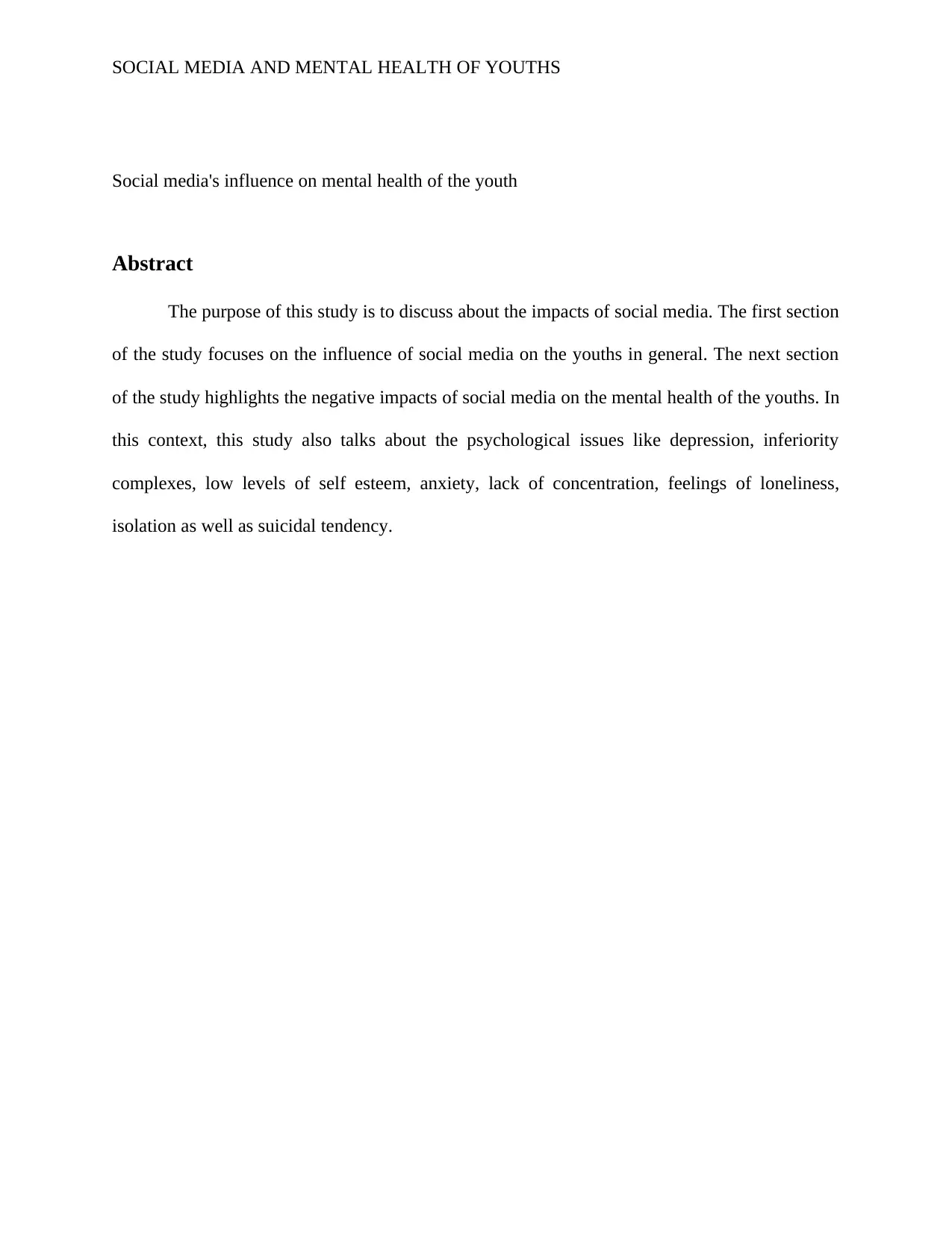
SOCIAL MEDIA AND MENTAL HEALTH OF YOUTHS
Social media's influence on mental health of the youth
Abstract
The purpose of this study is to discuss about the impacts of social media. The first section
of the study focuses on the influence of social media on the youths in general. The next section
of the study highlights the negative impacts of social media on the mental health of the youths. In
this context, this study also talks about the psychological issues like depression, inferiority
complexes, low levels of self esteem, anxiety, lack of concentration, feelings of loneliness,
isolation as well as suicidal tendency.
Social media's influence on mental health of the youth
Abstract
The purpose of this study is to discuss about the impacts of social media. The first section
of the study focuses on the influence of social media on the youths in general. The next section
of the study highlights the negative impacts of social media on the mental health of the youths. In
this context, this study also talks about the psychological issues like depression, inferiority
complexes, low levels of self esteem, anxiety, lack of concentration, feelings of loneliness,
isolation as well as suicidal tendency.
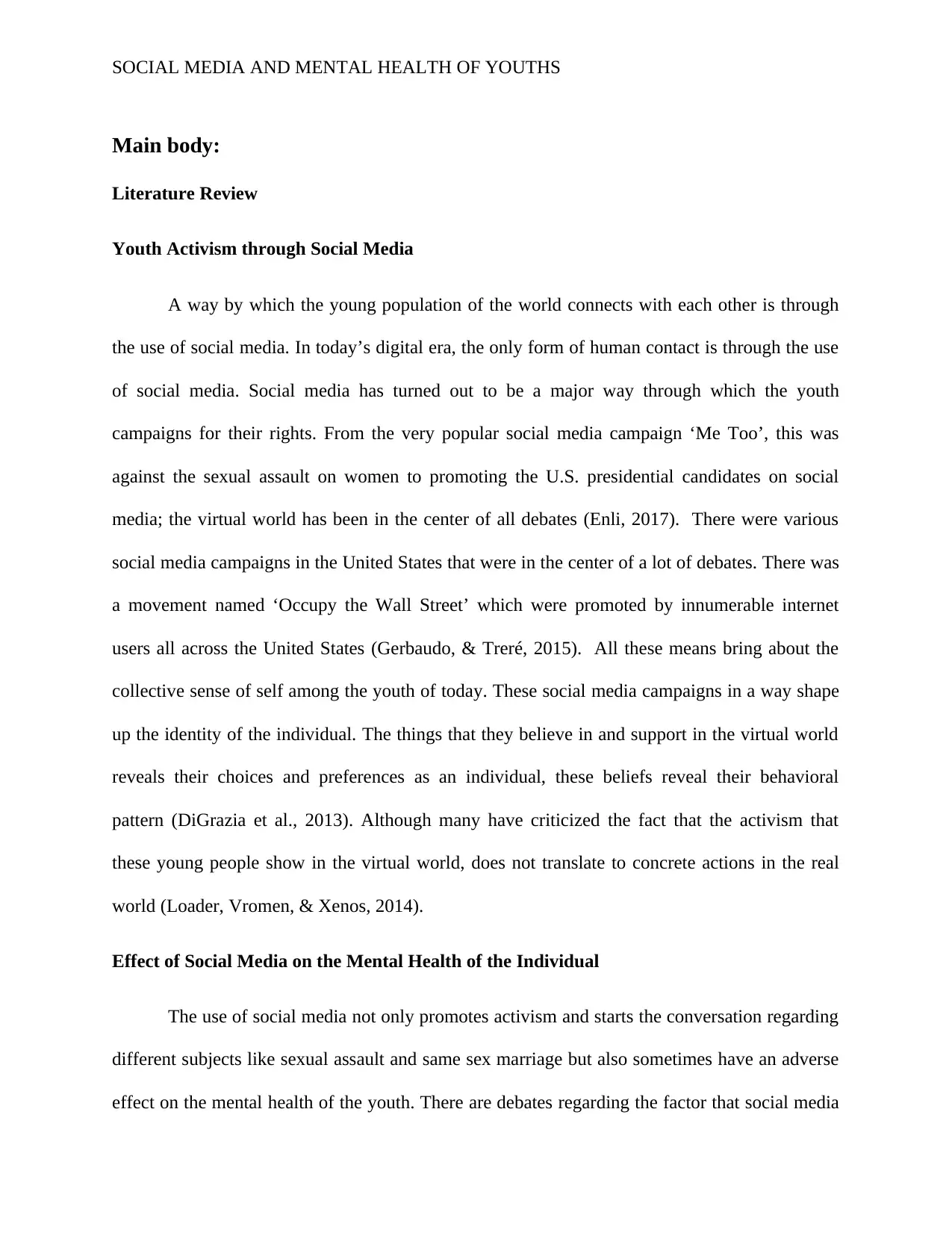
SOCIAL MEDIA AND MENTAL HEALTH OF YOUTHS
Main body:
Literature Review
Youth Activism through Social Media
A way by which the young population of the world connects with each other is through
the use of social media. In today’s digital era, the only form of human contact is through the use
of social media. Social media has turned out to be a major way through which the youth
campaigns for their rights. From the very popular social media campaign ‘Me Too’, this was
against the sexual assault on women to promoting the U.S. presidential candidates on social
media; the virtual world has been in the center of all debates (Enli, 2017). There were various
social media campaigns in the United States that were in the center of a lot of debates. There was
a movement named ‘Occupy the Wall Street’ which were promoted by innumerable internet
users all across the United States (Gerbaudo, & Treré, 2015). All these means bring about the
collective sense of self among the youth of today. These social media campaigns in a way shape
up the identity of the individual. The things that they believe in and support in the virtual world
reveals their choices and preferences as an individual, these beliefs reveal their behavioral
pattern (DiGrazia et al., 2013). Although many have criticized the fact that the activism that
these young people show in the virtual world, does not translate to concrete actions in the real
world (Loader, Vromen, & Xenos, 2014).
Effect of Social Media on the Mental Health of the Individual
The use of social media not only promotes activism and starts the conversation regarding
different subjects like sexual assault and same sex marriage but also sometimes have an adverse
effect on the mental health of the youth. There are debates regarding the factor that social media
Main body:
Literature Review
Youth Activism through Social Media
A way by which the young population of the world connects with each other is through
the use of social media. In today’s digital era, the only form of human contact is through the use
of social media. Social media has turned out to be a major way through which the youth
campaigns for their rights. From the very popular social media campaign ‘Me Too’, this was
against the sexual assault on women to promoting the U.S. presidential candidates on social
media; the virtual world has been in the center of all debates (Enli, 2017). There were various
social media campaigns in the United States that were in the center of a lot of debates. There was
a movement named ‘Occupy the Wall Street’ which were promoted by innumerable internet
users all across the United States (Gerbaudo, & Treré, 2015). All these means bring about the
collective sense of self among the youth of today. These social media campaigns in a way shape
up the identity of the individual. The things that they believe in and support in the virtual world
reveals their choices and preferences as an individual, these beliefs reveal their behavioral
pattern (DiGrazia et al., 2013). Although many have criticized the fact that the activism that
these young people show in the virtual world, does not translate to concrete actions in the real
world (Loader, Vromen, & Xenos, 2014).
Effect of Social Media on the Mental Health of the Individual
The use of social media not only promotes activism and starts the conversation regarding
different subjects like sexual assault and same sex marriage but also sometimes have an adverse
effect on the mental health of the youth. There are debates regarding the factor that social media
⊘ This is a preview!⊘
Do you want full access?
Subscribe today to unlock all pages.

Trusted by 1+ million students worldwide
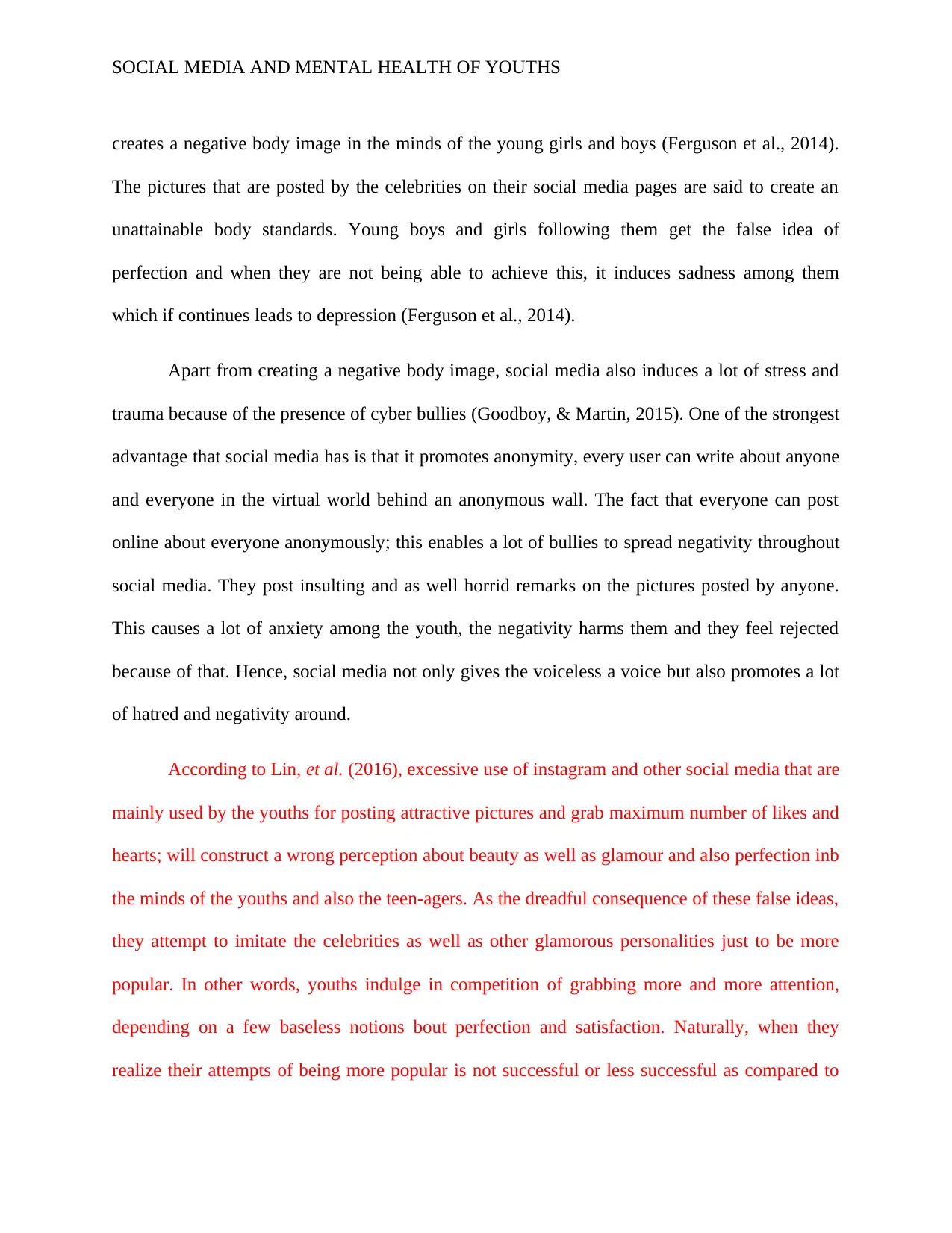
SOCIAL MEDIA AND MENTAL HEALTH OF YOUTHS
creates a negative body image in the minds of the young girls and boys (Ferguson et al., 2014).
The pictures that are posted by the celebrities on their social media pages are said to create an
unattainable body standards. Young boys and girls following them get the false idea of
perfection and when they are not being able to achieve this, it induces sadness among them
which if continues leads to depression (Ferguson et al., 2014).
Apart from creating a negative body image, social media also induces a lot of stress and
trauma because of the presence of cyber bullies (Goodboy, & Martin, 2015). One of the strongest
advantage that social media has is that it promotes anonymity, every user can write about anyone
and everyone in the virtual world behind an anonymous wall. The fact that everyone can post
online about everyone anonymously; this enables a lot of bullies to spread negativity throughout
social media. They post insulting and as well horrid remarks on the pictures posted by anyone.
This causes a lot of anxiety among the youth, the negativity harms them and they feel rejected
because of that. Hence, social media not only gives the voiceless a voice but also promotes a lot
of hatred and negativity around.
According to Lin, et al. (2016), excessive use of instagram and other social media that are
mainly used by the youths for posting attractive pictures and grab maximum number of likes and
hearts; will construct a wrong perception about beauty as well as glamour and also perfection inb
the minds of the youths and also the teen-agers. As the dreadful consequence of these false ideas,
they attempt to imitate the celebrities as well as other glamorous personalities just to be more
popular. In other words, youths indulge in competition of grabbing more and more attention,
depending on a few baseless notions bout perfection and satisfaction. Naturally, when they
realize their attempts of being more popular is not successful or less successful as compared to
creates a negative body image in the minds of the young girls and boys (Ferguson et al., 2014).
The pictures that are posted by the celebrities on their social media pages are said to create an
unattainable body standards. Young boys and girls following them get the false idea of
perfection and when they are not being able to achieve this, it induces sadness among them
which if continues leads to depression (Ferguson et al., 2014).
Apart from creating a negative body image, social media also induces a lot of stress and
trauma because of the presence of cyber bullies (Goodboy, & Martin, 2015). One of the strongest
advantage that social media has is that it promotes anonymity, every user can write about anyone
and everyone in the virtual world behind an anonymous wall. The fact that everyone can post
online about everyone anonymously; this enables a lot of bullies to spread negativity throughout
social media. They post insulting and as well horrid remarks on the pictures posted by anyone.
This causes a lot of anxiety among the youth, the negativity harms them and they feel rejected
because of that. Hence, social media not only gives the voiceless a voice but also promotes a lot
of hatred and negativity around.
According to Lin, et al. (2016), excessive use of instagram and other social media that are
mainly used by the youths for posting attractive pictures and grab maximum number of likes and
hearts; will construct a wrong perception about beauty as well as glamour and also perfection inb
the minds of the youths and also the teen-agers. As the dreadful consequence of these false ideas,
they attempt to imitate the celebrities as well as other glamorous personalities just to be more
popular. In other words, youths indulge in competition of grabbing more and more attention,
depending on a few baseless notions bout perfection and satisfaction. Naturally, when they
realize their attempts of being more popular is not successful or less successful as compared to
Paraphrase This Document
Need a fresh take? Get an instant paraphrase of this document with our AI Paraphraser
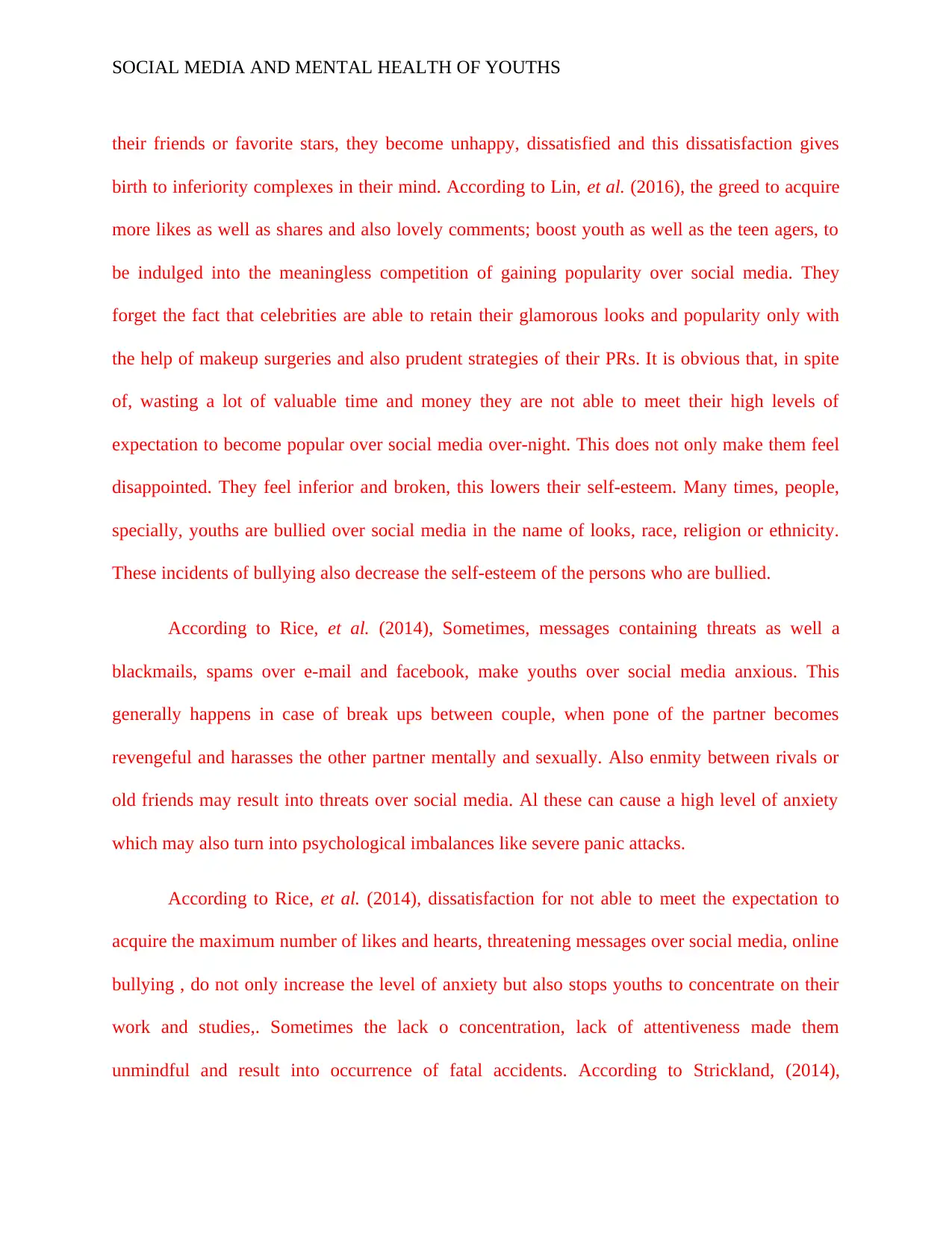
SOCIAL MEDIA AND MENTAL HEALTH OF YOUTHS
their friends or favorite stars, they become unhappy, dissatisfied and this dissatisfaction gives
birth to inferiority complexes in their mind. According to Lin, et al. (2016), the greed to acquire
more likes as well as shares and also lovely comments; boost youth as well as the teen agers, to
be indulged into the meaningless competition of gaining popularity over social media. They
forget the fact that celebrities are able to retain their glamorous looks and popularity only with
the help of makeup surgeries and also prudent strategies of their PRs. It is obvious that, in spite
of, wasting a lot of valuable time and money they are not able to meet their high levels of
expectation to become popular over social media over-night. This does not only make them feel
disappointed. They feel inferior and broken, this lowers their self-esteem. Many times, people,
specially, youths are bullied over social media in the name of looks, race, religion or ethnicity.
These incidents of bullying also decrease the self-esteem of the persons who are bullied.
According to Rice, et al. (2014), Sometimes, messages containing threats as well a
blackmails, spams over e-mail and facebook, make youths over social media anxious. This
generally happens in case of break ups between couple, when pone of the partner becomes
revengeful and harasses the other partner mentally and sexually. Also enmity between rivals or
old friends may result into threats over social media. Al these can cause a high level of anxiety
which may also turn into psychological imbalances like severe panic attacks.
According to Rice, et al. (2014), dissatisfaction for not able to meet the expectation to
acquire the maximum number of likes and hearts, threatening messages over social media, online
bullying , do not only increase the level of anxiety but also stops youths to concentrate on their
work and studies,. Sometimes the lack o concentration, lack of attentiveness made them
unmindful and result into occurrence of fatal accidents. According to Strickland, (2014),
their friends or favorite stars, they become unhappy, dissatisfied and this dissatisfaction gives
birth to inferiority complexes in their mind. According to Lin, et al. (2016), the greed to acquire
more likes as well as shares and also lovely comments; boost youth as well as the teen agers, to
be indulged into the meaningless competition of gaining popularity over social media. They
forget the fact that celebrities are able to retain their glamorous looks and popularity only with
the help of makeup surgeries and also prudent strategies of their PRs. It is obvious that, in spite
of, wasting a lot of valuable time and money they are not able to meet their high levels of
expectation to become popular over social media over-night. This does not only make them feel
disappointed. They feel inferior and broken, this lowers their self-esteem. Many times, people,
specially, youths are bullied over social media in the name of looks, race, religion or ethnicity.
These incidents of bullying also decrease the self-esteem of the persons who are bullied.
According to Rice, et al. (2014), Sometimes, messages containing threats as well a
blackmails, spams over e-mail and facebook, make youths over social media anxious. This
generally happens in case of break ups between couple, when pone of the partner becomes
revengeful and harasses the other partner mentally and sexually. Also enmity between rivals or
old friends may result into threats over social media. Al these can cause a high level of anxiety
which may also turn into psychological imbalances like severe panic attacks.
According to Rice, et al. (2014), dissatisfaction for not able to meet the expectation to
acquire the maximum number of likes and hearts, threatening messages over social media, online
bullying , do not only increase the level of anxiety but also stops youths to concentrate on their
work and studies,. Sometimes the lack o concentration, lack of attentiveness made them
unmindful and result into occurrence of fatal accidents. According to Strickland, (2014),
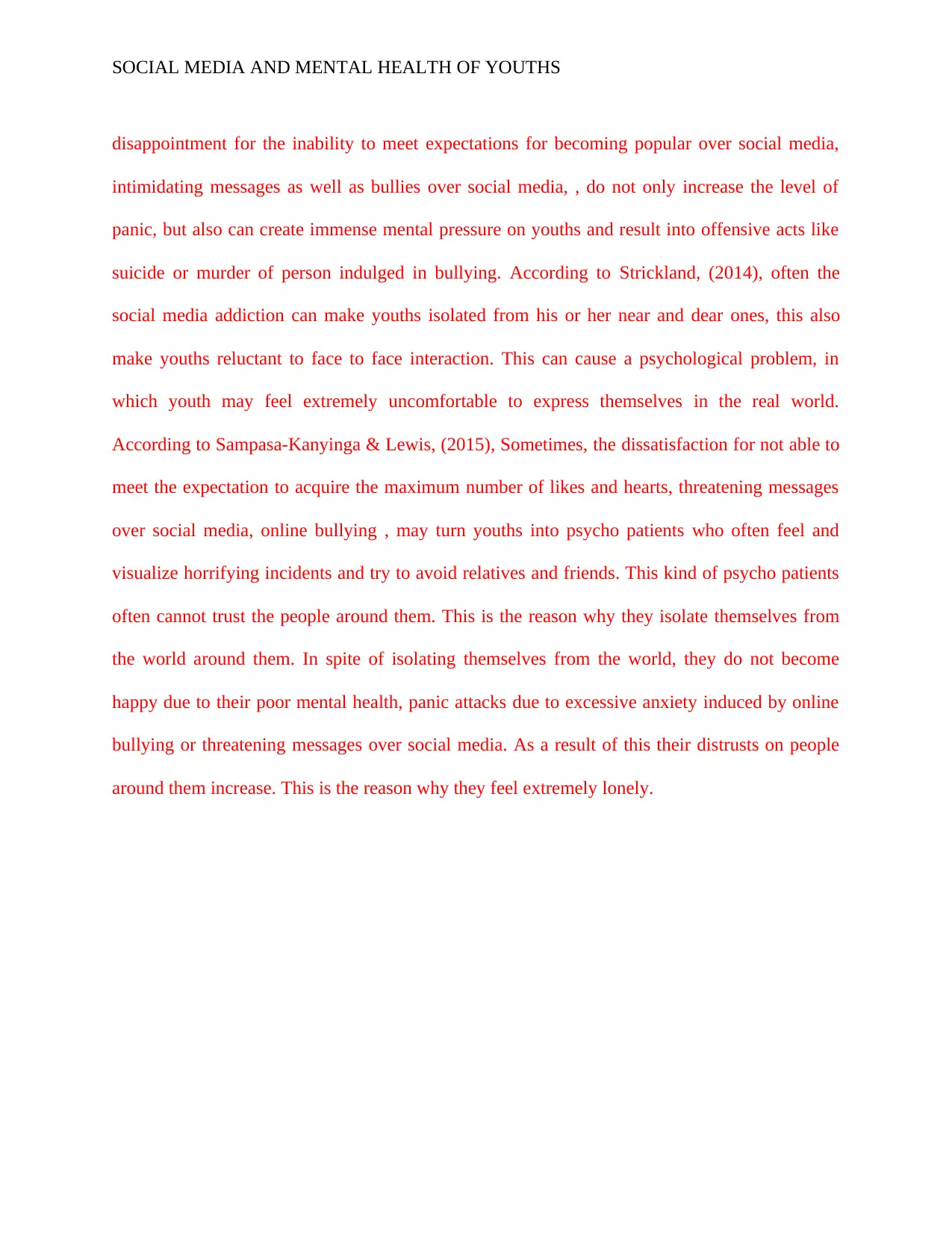
SOCIAL MEDIA AND MENTAL HEALTH OF YOUTHS
disappointment for the inability to meet expectations for becoming popular over social media,
intimidating messages as well as bullies over social media, , do not only increase the level of
panic, but also can create immense mental pressure on youths and result into offensive acts like
suicide or murder of person indulged in bullying. According to Strickland, (2014), often the
social media addiction can make youths isolated from his or her near and dear ones, this also
make youths reluctant to face to face interaction. This can cause a psychological problem, in
which youth may feel extremely uncomfortable to express themselves in the real world.
According to Sampasa-Kanyinga & Lewis, (2015), Sometimes, the dissatisfaction for not able to
meet the expectation to acquire the maximum number of likes and hearts, threatening messages
over social media, online bullying , may turn youths into psycho patients who often feel and
visualize horrifying incidents and try to avoid relatives and friends. This kind of psycho patients
often cannot trust the people around them. This is the reason why they isolate themselves from
the world around them. In spite of isolating themselves from the world, they do not become
happy due to their poor mental health, panic attacks due to excessive anxiety induced by online
bullying or threatening messages over social media. As a result of this their distrusts on people
around them increase. This is the reason why they feel extremely lonely.
disappointment for the inability to meet expectations for becoming popular over social media,
intimidating messages as well as bullies over social media, , do not only increase the level of
panic, but also can create immense mental pressure on youths and result into offensive acts like
suicide or murder of person indulged in bullying. According to Strickland, (2014), often the
social media addiction can make youths isolated from his or her near and dear ones, this also
make youths reluctant to face to face interaction. This can cause a psychological problem, in
which youth may feel extremely uncomfortable to express themselves in the real world.
According to Sampasa-Kanyinga & Lewis, (2015), Sometimes, the dissatisfaction for not able to
meet the expectation to acquire the maximum number of likes and hearts, threatening messages
over social media, online bullying , may turn youths into psycho patients who often feel and
visualize horrifying incidents and try to avoid relatives and friends. This kind of psycho patients
often cannot trust the people around them. This is the reason why they isolate themselves from
the world around them. In spite of isolating themselves from the world, they do not become
happy due to their poor mental health, panic attacks due to excessive anxiety induced by online
bullying or threatening messages over social media. As a result of this their distrusts on people
around them increase. This is the reason why they feel extremely lonely.
⊘ This is a preview!⊘
Do you want full access?
Subscribe today to unlock all pages.

Trusted by 1+ million students worldwide
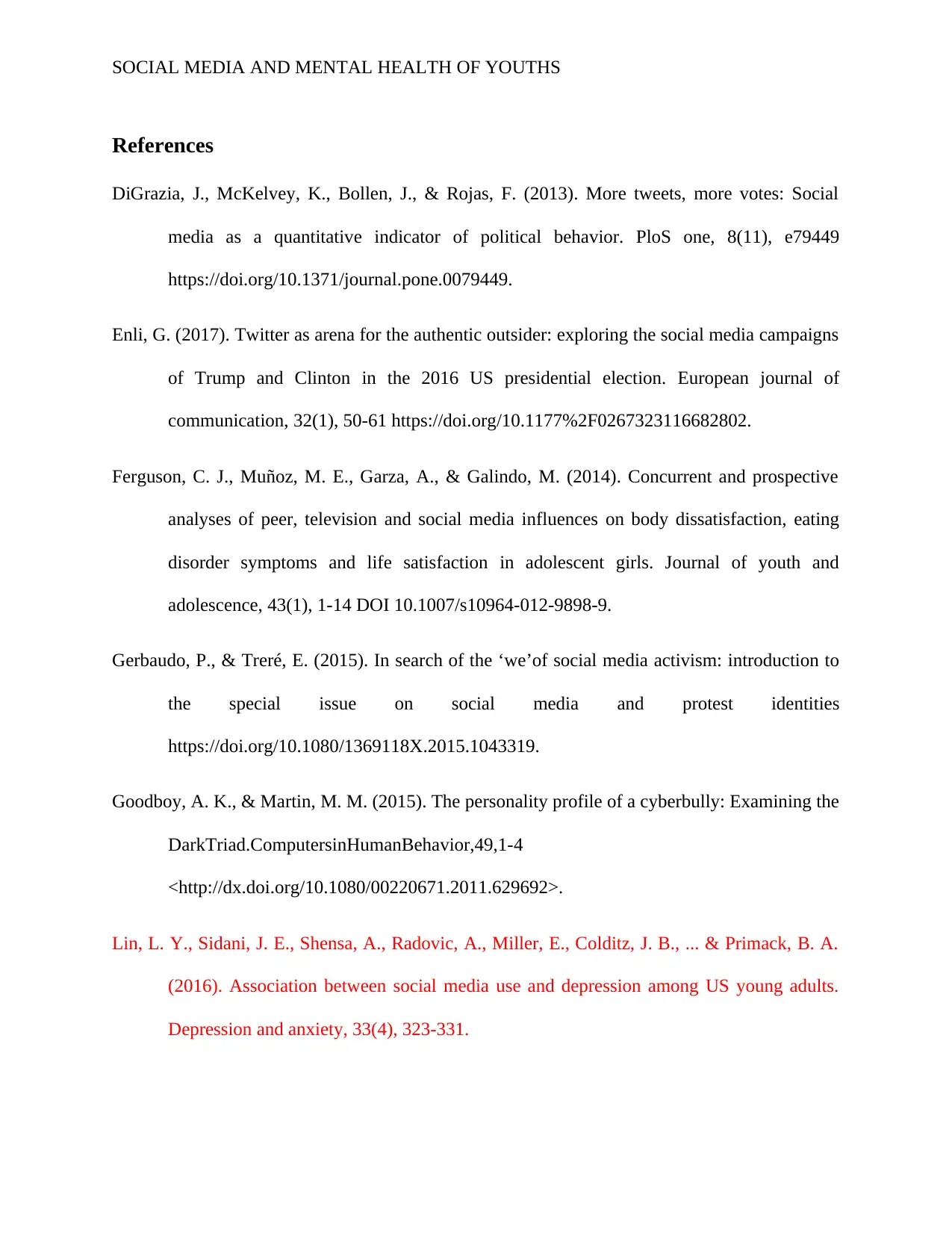
SOCIAL MEDIA AND MENTAL HEALTH OF YOUTHS
References
DiGrazia, J., McKelvey, K., Bollen, J., & Rojas, F. (2013). More tweets, more votes: Social
media as a quantitative indicator of political behavior. PloS one, 8(11), e79449
https://doi.org/10.1371/journal.pone.0079449.
Enli, G. (2017). Twitter as arena for the authentic outsider: exploring the social media campaigns
of Trump and Clinton in the 2016 US presidential election. European journal of
communication, 32(1), 50-61 https://doi.org/10.1177%2F0267323116682802.
Ferguson, C. J., Muñoz, M. E., Garza, A., & Galindo, M. (2014). Concurrent and prospective
analyses of peer, television and social media influences on body dissatisfaction, eating
disorder symptoms and life satisfaction in adolescent girls. Journal of youth and
adolescence, 43(1), 1-14 DOI 10.1007/s10964-012-9898-9.
Gerbaudo, P., & Treré, E. (2015). In search of the ‘we’of social media activism: introduction to
the special issue on social media and protest identities
https://doi.org/10.1080/1369118X.2015.1043319.
Goodboy, A. K., & Martin, M. M. (2015). The personality profile of a cyberbully: Examining the
DarkTriad.ComputersinHumanBehavior,49,1-4
<http://dx.doi.org/10.1080/00220671.2011.629692>.
Lin, L. Y., Sidani, J. E., Shensa, A., Radovic, A., Miller, E., Colditz, J. B., ... & Primack, B. A.
(2016). Association between social media use and depression among US young adults.
Depression and anxiety, 33(4), 323-331.
References
DiGrazia, J., McKelvey, K., Bollen, J., & Rojas, F. (2013). More tweets, more votes: Social
media as a quantitative indicator of political behavior. PloS one, 8(11), e79449
https://doi.org/10.1371/journal.pone.0079449.
Enli, G. (2017). Twitter as arena for the authentic outsider: exploring the social media campaigns
of Trump and Clinton in the 2016 US presidential election. European journal of
communication, 32(1), 50-61 https://doi.org/10.1177%2F0267323116682802.
Ferguson, C. J., Muñoz, M. E., Garza, A., & Galindo, M. (2014). Concurrent and prospective
analyses of peer, television and social media influences on body dissatisfaction, eating
disorder symptoms and life satisfaction in adolescent girls. Journal of youth and
adolescence, 43(1), 1-14 DOI 10.1007/s10964-012-9898-9.
Gerbaudo, P., & Treré, E. (2015). In search of the ‘we’of social media activism: introduction to
the special issue on social media and protest identities
https://doi.org/10.1080/1369118X.2015.1043319.
Goodboy, A. K., & Martin, M. M. (2015). The personality profile of a cyberbully: Examining the
DarkTriad.ComputersinHumanBehavior,49,1-4
<http://dx.doi.org/10.1080/00220671.2011.629692>.
Lin, L. Y., Sidani, J. E., Shensa, A., Radovic, A., Miller, E., Colditz, J. B., ... & Primack, B. A.
(2016). Association between social media use and depression among US young adults.
Depression and anxiety, 33(4), 323-331.
Paraphrase This Document
Need a fresh take? Get an instant paraphrase of this document with our AI Paraphraser
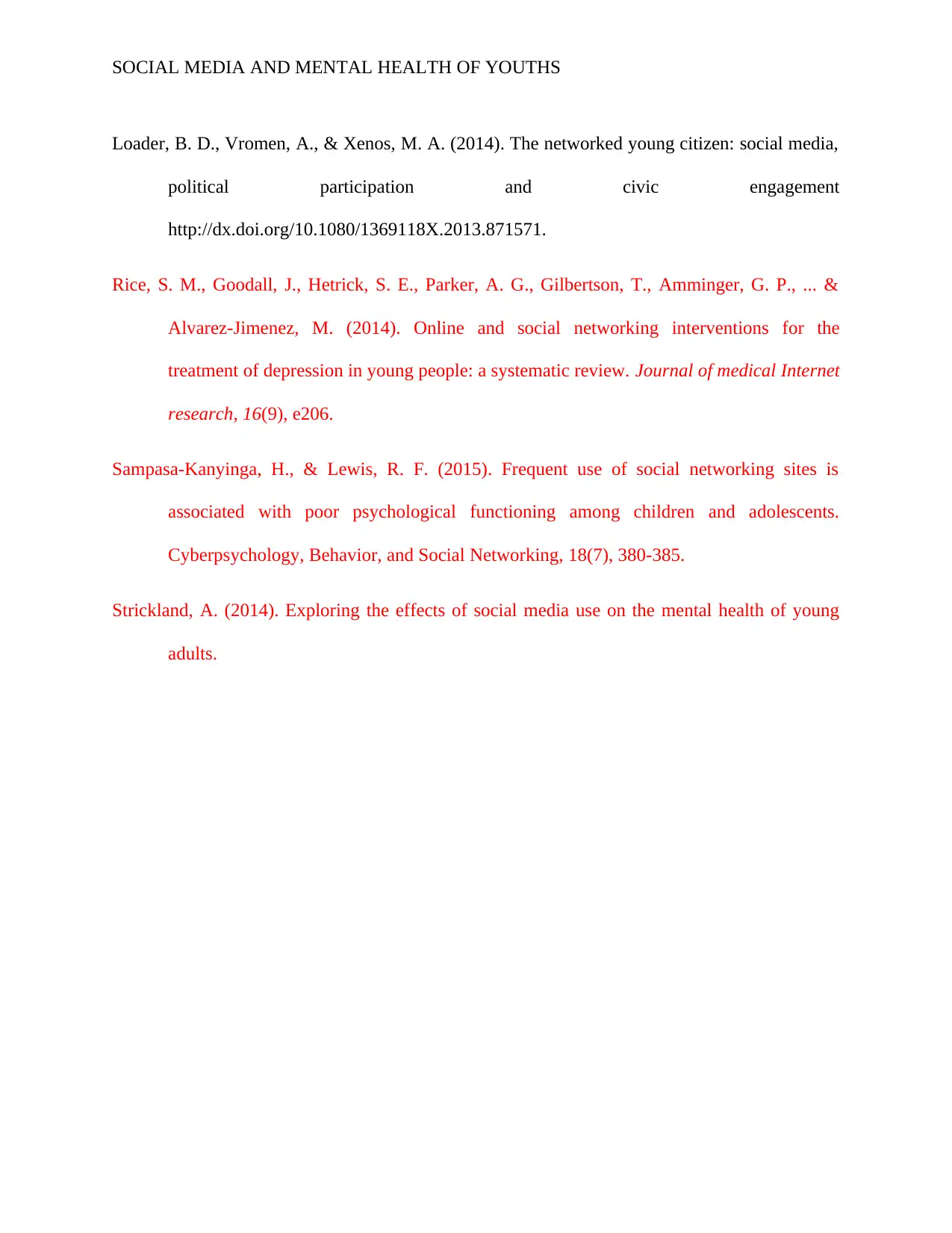
SOCIAL MEDIA AND MENTAL HEALTH OF YOUTHS
Loader, B. D., Vromen, A., & Xenos, M. A. (2014). The networked young citizen: social media,
political participation and civic engagement
http://dx.doi.org/10.1080/1369118X.2013.871571.
Rice, S. M., Goodall, J., Hetrick, S. E., Parker, A. G., Gilbertson, T., Amminger, G. P., ... &
Alvarez-Jimenez, M. (2014). Online and social networking interventions for the
treatment of depression in young people: a systematic review. Journal of medical Internet
research, 16(9), e206.
Sampasa-Kanyinga, H., & Lewis, R. F. (2015). Frequent use of social networking sites is
associated with poor psychological functioning among children and adolescents.
Cyberpsychology, Behavior, and Social Networking, 18(7), 380-385.
Strickland, A. (2014). Exploring the effects of social media use on the mental health of young
adults.
Loader, B. D., Vromen, A., & Xenos, M. A. (2014). The networked young citizen: social media,
political participation and civic engagement
http://dx.doi.org/10.1080/1369118X.2013.871571.
Rice, S. M., Goodall, J., Hetrick, S. E., Parker, A. G., Gilbertson, T., Amminger, G. P., ... &
Alvarez-Jimenez, M. (2014). Online and social networking interventions for the
treatment of depression in young people: a systematic review. Journal of medical Internet
research, 16(9), e206.
Sampasa-Kanyinga, H., & Lewis, R. F. (2015). Frequent use of social networking sites is
associated with poor psychological functioning among children and adolescents.
Cyberpsychology, Behavior, and Social Networking, 18(7), 380-385.
Strickland, A. (2014). Exploring the effects of social media use on the mental health of young
adults.
1 out of 8
Related Documents
Your All-in-One AI-Powered Toolkit for Academic Success.
+13062052269
info@desklib.com
Available 24*7 on WhatsApp / Email
![[object Object]](/_next/static/media/star-bottom.7253800d.svg)
Unlock your academic potential
Copyright © 2020–2026 A2Z Services. All Rights Reserved. Developed and managed by ZUCOL.





